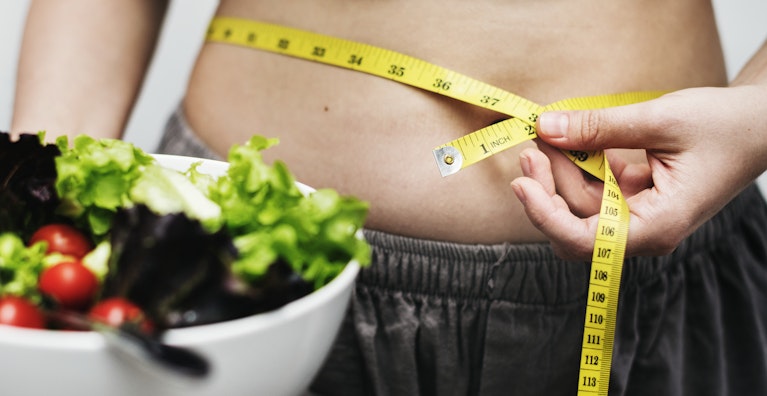Weight gain in COVID-19 and how to flatten the curve
Author: Prabhmehar Walia
&Author: Dr. Namita Singh
Sitting on your couch, binge-eating your favourite comfort food, does the worry of gaining all those extra pounds make you shudder? There’s no need to go hard on yourself. Here’s a safe space to equip you with all the bullet points you need to make the tables turn
What’s the fuss about?
A nutrition scientist and professor of diet and population health at University of Oxford, Susan Jepp addresses her concern about weight gain during covid. Her recent research found a striking association of an individual’s weight (by measuring the BMI) and the likelihood of being infected by the virus.The worldwide pandemic has given rise to another one; an obesity pandemic with no vaccine in sight.

What is behind the fuss ?
Interestingly enough, it all started as a way to cope up with ‘new normal’. Call it stress-eating or a source of distraction, we all found ourselves trying our hands at baking pita bread at home, sharpening our cutlery skills and making most of the ‘work from home’ environment/lifestyle.
For others, it was simply the drowning of self into heaps of oreos to get out of a slump.Ironically, this instant gratification only circles back to spike up your worries later.
How to rid yourself of the extra fuss ?
Increase your movement
When the input is more than the output, some extras are sure to stick around with you - that’s a no brainer. Many people have been thrown off the habit of working out since the shutdown of gyms earlier this year. Exercise will not only help you shed those pounds but also boost your immunity, release stress, and reduce anxiety.Hence, it is althemore important to form a habit of stretching those muscles in the comfort of your house. A plethora of interactive zumba/aerobics/yoga classes online, can help you do just that.
Whatever’s your cup of coffee. Or a simple 10 minutes morning walk could go a long way too.
Keep track of your sleep cycle
It is very easy to lose sense of time when you’re bound at home for an uncertain amount of time.
A sleep-wake cycle turned upside down could lead to unhourly eating and midnight snacking - the verbs no healthy person would swallow down.
Sleep deprivation might further cause a hormonal imbalance between ghrelin (your body’s hunger hormone) and leptin (satiety hormone); ultimately leaving you tired and hungry around the clock. The adult human body needs at least 8-10 hours of sleep to function properly. Monitor your sleep by using sleep tracking apps and reducing your time on the internet.
Be mindful of what’s on your plate
Recent studies have proven our brain is affected by what we eat in a day. A diet full of fat and sugar strips you off the essential nutrients your mind and body needs to function maximally. Omega-3, vitamin B3 and other vitamin deficiencies are proven to leave you at greater risk of cardiovascular diseases and other immune diseases. Re-prioritize veggies, nuts and high protein food in your diet. You could also try adding different herbs to your tea (lavender, chamomile, tulsi) for that extra immunity boost. This will not just make you feel light but also keep the blues at bay.
Take control of your day
With each day seamlessly woven to the next in a never ending melody, most people complain about losing all kinds of structure to their day. Try chalking out a schedule that works in your favour. Prioritize and set a time limit for tasks at hand to avoid accumulating work at the last minute. Make sure to give yourself regular breaks in between to recharge.
We might feel helpless about the rising covid cases and testing, but we have more control over ourselves than we think we do - and that makes all the difference. Catch a breath and start over.
Source:
Share this on Social media
HEALTH DISCLAIMER
This blog provides general information and discussions about health and related subjects. The information and other content provided in this blog, or in any linked materials, are not intended and should not be construed as medical advice, nor is the information a substitute for professional medical expertise or treatment.
The content is for information purpose only and is not a medical advice. Qualified doctors have gathered information from reputable sources; however Credence Medicure Corporation is not responsible for errors or omissions in reporting or explanations. No individual should use the information, resources and tools contained herein to self diagnose or self treat any medical condition.
If you or any other person has a medical concern, you should consult with your health care provider or seek other professional medical treatment. Never disregard professional medical advice or delay in seeking it because of something that have read on this blog or in any linked materials. If you think you may have a medical emergency, call your doctor or emergency services immediately.
The opinions and views expressed on this blog and website have no relation to those of any academic, hospital, health practice or other institution.
Credence Medicure Corporation gives no assurance or warranty regarding the accuracy, timeliness or applicability of the content.
comments powered by Disqus

